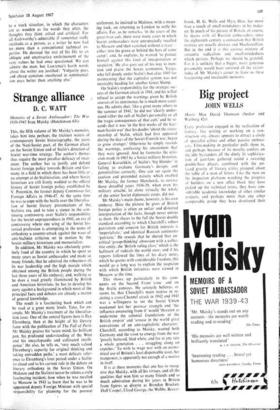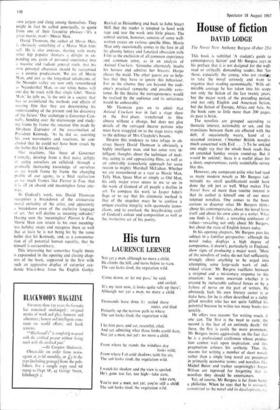Big project
JOHN WELLS
Movie Man David Thomson (Seeker and Warburg 42s) Every profession engaged in the realisation of fantasy. like writing or working on a con- struction site, always appears to attract a circle of specialist critics and other passive enthusi- asts. Film-making in particular pulls them in, and perhaps because of its novelty confers on the idle bystanders all the dimly lit sophistica- tion of jazz-fans gathered round a sweating double-bass player, combined with the po- faced gravity of literary critics grouped about the table of a man of letters. Like the men on the inspection platform watching the progress of builders on a new office block they have picked up the technical terms, they have con- siderable academic knowledge of other similar projects, and perhaps more than any other comparable group they have developed their
own jargon and slang among themselves. They might in fact be called generically, to quote from one of their favourite phrases—'it's a great movie, man'—Movie Man.
David Thomson, the author of Movie Man, is obviously something of a Movie Man him- self. He is also anxious, sharing with many other hip popular thinkers a delight in ex- panding any grain of personal experience into a massive and radiant general truth, that his omi personal obsession should be recognised as a cosmic predicament. We are all Movie Man, and just as the long-dead inhabitants of the Neander valley are now only remembered as Neanderthal Man, so our white bones will one day be stuck with that single label. 'Movie Man.' he tells us, 'is the unit in a society that ha; so assimilated the methods and effects of moving film that they are determining his understanding of the present and his discovery of the future.' Our archetype is Governor Con- nally, bending over the microscope and study- ing frame by frame the amateur film made by Abraham Zapruder of the assassination of President Kennedy. 'As he did so, assessing his own movements and reactions, he con- cluded that he could not have been struck by the bullet that hit Kennedy.'
Our reactions, like those of Governor Connally, develop from a first naïve delight at seeing ourselves on celluloid. through a gradually increasing knowledge of ourselves as we watch frame by frame the changing profile of our agony, to a final realisation al a e reach frames like Pierrot le Fou, that it is all an absurd and meaningless farce any- way.
In Godard's work, too, David Thomson recognises a breakdown of the aristocratic moral certainty of the artist, and apparently a breakdown even of the exclusive language of art. 'Art will decline as meaning subsides.' Having seen the 'meaningless' Pierrot le Fou, Nlovie Man can return to his own meaning- less holiday snaps and recognise there as well that at least he is not being 'hit by the same bullet that hit Kennedy, and, as a consumma- tion of all potential human equality, that he
himself is extraordinary. '
This interesting but somewhat fragile thesis is expounded in the opening and closing chap- ters of the book, supported in the first with such an aggressive display of cut-price aca- demic bric-a-brac from the English Gothic
Revival to Heisenberg and back to John Stuart Mill that the reader is tempted to howl with rage and tear the work into little pieces. The central section, however, consists of some well- written essays on various specific films. Movie Man only occasionally comes to the fore in all his gloomy lunacy and fanatical obsession with Film to the exclusion of all common experience and common sense, as in an analysis of Animal Crackers. 'Groucho alternately insults his hostess and admires her breasts; Harpo chases the maid. The other guests are so help- less that they have to ignore this behaviour. For in the cinema they are beyond the audi- ence's practical sympathy and possible assis- tance. In the theatre the outrageousness would be realised by the audience and its unfairness would be unbearable.'
Mr Thomson goes on to admit that Animal Crackers was in fact a stage show in the first place, transferred to film almost without a change, but does not give details of the outraged theatre patrons who must have struggled on to the stage every night to the defence of Mrs Claypole's bosom.
Despite this tendency to take refuge in ab- stract theory David Thomson is obviously a highly intelligent man, and has some very in- telligent thoughts about the technique of mak- ing. acting in and appreciating films. as well as an admirably iconoclastic approach for some reason to mighty Marshall McLuhan. Whether we are remembered as a race as Movie Man, Telly Man, Space Man or simply as Old Man, his only major error seems to me to see in the work of Godard of all people a decline in art. To compare his work to Jasper John's flags or to say that his cinematic method is that of the snapshot must be to confuse a unique creative integrity with spasmodic icono- clasm, and to overlook the breathtaking craft of Godard's colour and composition as well as the instinctive art of his poetry.































 Previous page
Previous page